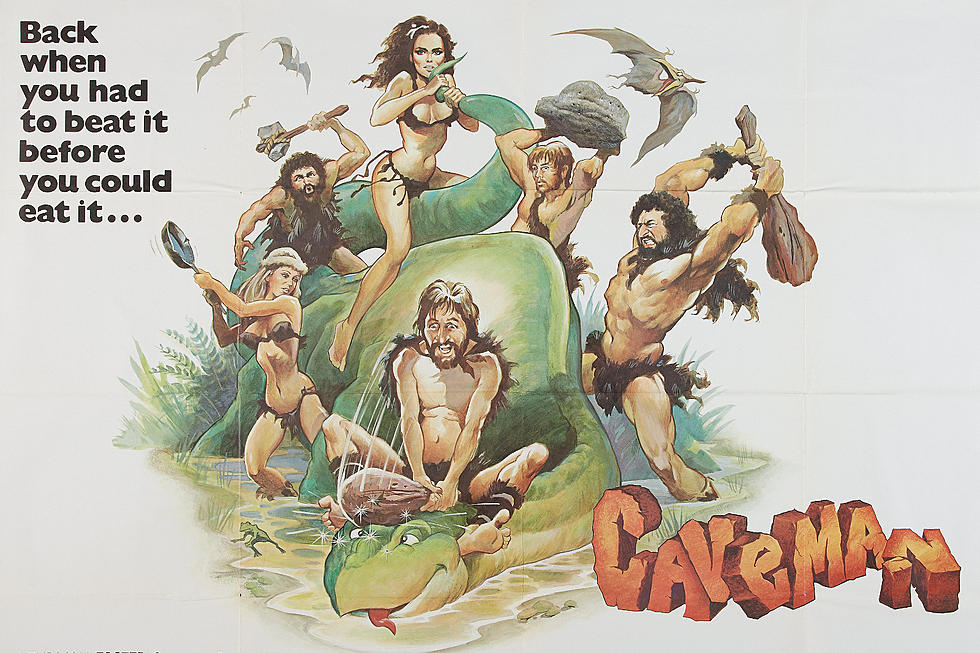
40 Years Ago: Ringo Starr’s Sophomoric Stone Age Comedy ‘Caveman’
One of the most fascinating questions in American cinema is about the long comedic dry spell from the late 1960s to the dawn of the 1980s, when funny movies mostly turned terrible, and films like the Ringo Starr vehicle Caveman – which premiered on April 17, 1981 – dominated the landscape.
In the 1930s and '40s, America produced legions of so-called screwball comedies like It Happened One Night, Bringing Up Baby, and Ninotchka, that paired strong, interesting female leads with brilliant, innuendo-laced and machine gun-paced dialogue. In the '50s and 60's, more elegant films about domestic life and satirical romances began to predominate, from The Seven Year Itch to The Apartment, with high-gloss farces like The Pink Panther or It's a Mad, Mad, Mad World thrown in.
Then the '70s hit and the bottom fell out. Aside from a few oddball geniuses like Mel Brooks, it was as if American directors had suddenly decided that the mainstream audience was dumb, or that only a kind of silliness bordering on inanity would sell tickets.
Caveman epitomizes this trend. It tells the story of Atouk (Starr) who is, as the title suggests, a caveman. He lives in a tribe led by a huge brute named Tonda (ex-NFL player John Matuzak) and is in love with Tonda's voluptuous girlfriend Lana (Barbara Bach – who would end up marrying Starr after they met on the film.) Unfortunately, Atouk is a little too curious and thinky for this hirsute collective and so he gets kicked out.
Soon, Atouk joins another more eclectic group, where he's joined by the slow-witted Lar (Dennis Quaid), a blind old man named Gog (Jack Gilford), and and annoying woman named Tala (Shelley Long). The latter immediately develops a crush on Atouk, despite the fact that he only wants to sleep with Lana. In this outfit of misfits, Atouk's cleverness starts to pay dividends. Under his leadership, they discover fire and invent music, learn how to cook and how to walk upright. By the end of the film they invent weapons, which they use to defeat the more primitive cavemen led by Tonda. After this battle, Lana is Atouk's for the taking, but he of course chooses Tala instead and they all live happily ever after.
In any movie like this the plot is only a pretext for a series of gags, and it succeeds or fails on the strength of those gags. And this is where Caveman makes one wonder what the hell happened to people's sense of humor in the '70s.
There are some funny bits. One caveman (played by Evan Kim) speaks in regular English, but can't be understood by the others who only use grunts and a kind of caveman dialect (people who saw the movie in person received a pamphlet that allowed them to translate the 30 or so words of the caveman language.) There's a silly stop-motion T-Rex who chases the cavemen around, and a big dinosaur lizard that crows like a rooster at dawn. And at one point the cavemen wander into an ice age and confront an abominable snowman who reads as a parody of the monster in the opening of The Empire Strikes Back.
But for the most part, the film's gags seem like they were thought up by people who understood what humor was in the abstract, just had no idea how to put it on the screen. Poorly-imagined pratfalls dominate: Look! Matuzak is raising a big rock! Oop, he fell over backwards! Cartoon-style shenanigans fall flat again and again, like when the bad guys chase the good guys around a giant egg and then the good guys hide and the bad guys keep going around. And even when the ideas are sterling – as in a sequence where Quaid gets his legs wrapped around each other and can't figure out how to untangle them – the performances and staging turn them wincingly dull.
Beyond this, as in so many '70s comedies, a kind of frat-boy for yucks sensibility overlays everything. We get an inevitable gag in which farts catch fire. And when Atouk first tries to sleep with Lana, he does so by getting her stoned on drug-berries until she passes out, and then trying to prop her unconscious body into position so he can get on top of her, only to be foiled because she keeps rolling over in her sleep.
The contemporary take on all of this is tends to be that American audiences in the 1970s were discovering marijuana for the first time and so everyone in the theater was stoned and thought all these bits were uproarious. And there may be a kernel of truth in this idea, as the movie earned four times its $4 million budget at the box office.
But the better explanation is that American life in the 1970s didn't offer filmmakers much material for comedy. The Vietnam War had left the country fractured, the economy was in a shambles, nobody trusted the government or corporations, women, people of color and gay folks were agitating for full citizenship, and it was dawning on society that the environment was being destroyed.
This produced a great decade for horror, dystopic science-fiction, hard-edged cop films and serious drama. Soon enough, the '80s would usher in a rampant commercialism that would provide great fodder, and the comedy film would come roaring back to life. But, aside from absurdist gems like Blazing Saddles or Airplane!, the land before Reaganite excess was a lousy time to try to be funny - and Caveman proves it.



